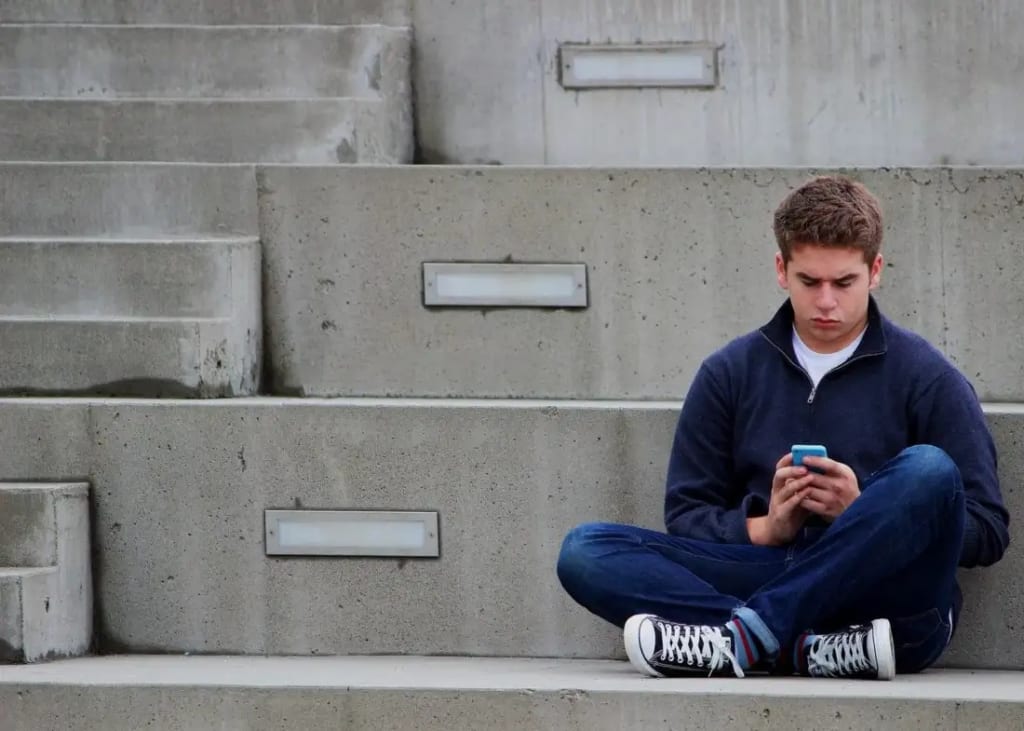Social Media and Its Impact on Loneliness
The science behind loneliness and whether social media can be the perfect cure for this social dilemma

Human beings are social creatures that thrive on social interactions with other fellow human beings. Building and maintaining quality relationships with others is a vital component for the development of positive mental health and wellbeing. Any lack of social contact with other people can only serve to increase feelings of loneliness, which is a known risk factor for the development of common mental health disorders (e.g., depression, anxiety).
One study, which surveyed young people across care systems in both Finland and England, found that those who reported having strong social support networks also reported having higher mental wellbeing compared to those who reported having no such networks of support.
Now that we live in the age of social media, human beings no longer need to be in each other’s presence to exchange conversations and interact with one another. Therefore, it would seem plausible to think that social media use could compensate for any lack of in-person social interactions and reduce feelings of loneliness.
In this story, we will examine what loneliness is, exactly how social media affects loneliness and whether or not social media can be a useful cure for this problem or if real in-person social interactions are a better course of treatment.
Definition of loneliness

In order to understand an individual’s experience of loneliness, it is important to consider the very definition of loneliness and how it affects a person’s health and wellbeing. When studying loneliness, it is important to draw a distinction between the objective experience of being alone and the subjective experience of feeling lonely.
This is because a person who spends a lot of time on their own may enjoy doing so and not feel lonely as a result while others may spend a lot of time in the presence of other people without feeling included within their social group/s and thus end up feeling lonely.
There are a range of factors that can contribute to the development of this feeling. Separation, divorce, family neglect/abuse and mental health issues are just a few examples of factors that can increase ones feelings of loneliness. As mentioned before, loneliness can serve as a risk factor for the development of mental health disorders, but more surprisingly, it can also contribute to the development of physical health disorders too.
A study in Switzerland found that, higher levels of loneliness was associated with an increased risk of developing serious physical health problems such as cancer, heart disease, stroke, diabetes and high levels of cholesterol as well as mental health problems such as depression and anxiety.
Moreover, it should come as no surprise that these effects were more pronounced in older adults than younger adults. However, what can come as a surprise is that loneliness is considered to be just as lethal as smoking. One study in India, found that loneliness contributes to rates of premature death and mortality on an equal level to smoking 15 cigarettes per day.
As such, loneliness has been identified by governments and health institutions as a serious public health issue that needs combating through various interventions to promote positive health and wellbeing among citizens.
Social media and its effect on loneliness
Many people will often use social media sites to cure themselves of loneliness, but social media use may not be as effective of an intervention as many people are led to believe.
Examination of scientific research into the relationship between social media use and loneliness shows that social media use does not have the curing effects on loneliness that many socially isolated users seek. Instead, the effects have been shown to work in the opposite direction, meaning social media use actually increases a person’s state of loneliness.
An American study among a group of young adults aged 19–32 years old examined the link between their social media use and perceived social isolation. The findings revealed that high social media use was significantly associated with strong feelings of perceived social isolation, thus suggesting that high social media use only serves to heighten a young person’s feelings of loneliness.
Considering the scale of this problem, it is clear to see why many health experts may label social media addiction as a disorder, even though it has not been officially classified as one by the World Health Organization (WHO) or the Diagnostic and Statistical Manual of Mental Disorders (DSM 5).
According to the American Addiction Center, social media use disorder is characterized as being “overly concerned about social media, driven by an uncontrollable urge to log on to or use social media, and devoting so much time and effort to social media that it impairs other important life areas”.
One country that uses this term frequently to describe such individuals is Lebanon. Social media use in Lebanon is extremely high and the country also has some very high rates of loneliness. A study was conducted there to examine the relationship between social media use disorder and loneliness and to better understand the magnitude and scope of this problem within Lebanese society.
The study found that high social media use disorder, along with high levels of insomnia and alexithymia were associated with increased feelings of loneliness among Lebanese people. More worryingly though, 23.7% of participants in this survey were characterized as having this disorder, a trend that if generalized to the wider Lebanese population, would implicate a significant health concern for citizens and health officials in the country.
Therefore, the use of social media as an alternative to in-person social interactions for reducing feelings of loneliness may not be a wise choice. However, there are a range of other useful interventions that can be used to tackle loneliness. Perhaps the most obvious one being to increase the number of in-person social interactions that one has with others.
Research in China has shown that while internet connection is not associated with an enhanced quality of life, in-person social interactions are and this has implications for reducing loneliness and improving social connectivity. Other research has also found that in-person social interactions foster a strong sense of closeness and self-disclosure which is not offered through digital communication.
However, despite these benefits, expanding one’s social network and increasing one’s opportunities for in-person social interactions may be of greater difficulty for some individuals than others.
Socially disadvantaged individuals in this respect, who often feel lonely, can benefit from participating in various programmes and schemes that are useful for addressing loneliness such as social skills training, local community groups and befriending support services.
Measures like these can help reduce their feelings of loneliness either by increasing opportunities for in-person interactions or by providing a strong sense of connectedness and social support. Therapy and counselling services can also be useful for tackling feelings of loneliness and helping lonely patients reflect on their subjective experience of feeling lonely and providing useful strategies to combat this feeling.
The impact of the coronavirus pandemic on loneliness

If any discussions concerning the nature of loneliness and social media use are to be held at this current time, it would be unreasonable not to explore the impact that the coronavirus pandemic has had on people’s state of loneliness and their usage of social media. Globally, the coronavirus pandemic has entailed a series of tough measures that have restricted our contact with friends and family members living within different households.
As a consequence, you would expect these restrictions would only serve to increase a person’s feelings of loneliness and prompt a higher usage of social media streams to maintain contact with others and research has found this to be the case.
In terms of the pandemic’s impact on loneliness, a survey in the UK found that loneliness was 27% prevalent during the first lockdown period in early 2020. Furthermore, the results showed this prevalence to be more pronounced in young adults compared to any other age group.
This finding could most likely be attributed to the fact that older age adults tend to have less contact with others compared to younger adults and, as such, restrictions on social contact for younger adults require greater adjustment than what they would for older age groups.
As for social media use, a market research agency in the UK found that social media use increased by 61% globally during the first phase of the pandemic with WhatsApp showing the highest increase (41%).
Therefore, loneliness is just another one of many epidemics that has occurred as a direct result of the pandemic and people have resorted to social media to maintain contact with others and compensate for the lack of opportunities to socialize with family and friends. However, the effects of social media use on feelings of loneliness were not equally distributed among individuals of different age groups.
By initial surprise, one study found that increased social media use was associated with higher feelings of loneliness in younger adults, the most affected by the loneliness pandemic, but lower feelings of loneliness in older adults, the least affected group, during the pandemic. One may believe that the most affected group, in this case, young adults, would benefit most from alternatives to in-person social interactions in an attempt to cure or suppress feelings of loneliness, but this wasn’t found to be the case.
Explanations for this finding are subject to individual interpretation but the most likely explanation could be that social media use may well have caused young adults to grieve over the loss of in-person interactions they would have frequently had with others in a pre-pandemic world. This means interventions that seek to reduce loneliness in young adults should be prioritized during pandemics but any adverse impacts on older adults should not be neglected.
Therefore, some of the aforementioned strategies that can be utilized in a coronavirus pandemic to reduce loneliness such as social skills training, therapy and counselling services are useful tools for coping with this problem in a period of social isolation.
Moreover, because loneliness is an emotion of social disconnectedness that can even be felt by individuals with a lot of social contact, pandemics can be a useful opportunity for such individuals to prioritize improving and enhancing the quality of relationships with family and others living within their households.
Research has shown that families who commit to spending quality time together are much happier than families who spend a lot of time apart.
Final Thoughts
In addressing the title of this story by reference to the research presented, social media is not the cure for dealing with feelings of loneliness and social isolation. In fact, social media seems to be making us feel more disconnected than connected, which is an opposite effect to what social media was created for and this problem has heightened as a direct consequence of the coronavirus pandemic.
Therefore, in seeking interventions and strategies to reduce loneliness, one must prioritize increasing their opportunities for in-person social interactions and improve the quality of their current relationships with others.
Of course, social media can be a useful way to maintain contact with family and friends, particularly during a restricted pandemic, and can be beneficial if used in conjunction with having regular in-person interactions with others. However, it should not be used excessively or as a substitute for spending time with others in their physical presence.

With scientists optimistic of the end of the pandemic being in sight, hopefully this means the end of the loneliness pandemic is in sight too and opportunities to connect and interact with others face-to-face will last an eternity.
Given the uncertainties pandemics are capable of creating, now is a great time to capitalize on these opportunities to socialize face-to-face with family and friends before they are potentially taken away from us in a short period of time at an unprecedented level.
I hope you found this story to be helpful in allowing you to understand what loneliness is and what steps you can take to overcome this feeling. If loneliness is an emotion you experience frequently and this story resonates with you, then please feel free to use the responses section below to share your experiences of loneliness and what strategies you have used to cope with it.
Instead of using social media to cope with loneliness, I also hope this story has encouraged you to develop the confidence and motivation to meet people in-person and build new or rekindle existing relationships with others and to share in the joy of having meaningful social interactions in each other’s presence.
About the Creator
Andrew-Stuart
My passion is to write stories related to the topics of psychology and mental health | (Bsc) Hons Applied Psychology Student at Glasgow Caledonian University 😁
Reader insights
Nice work
Very well written. Keep up the good work!
Top insights
Easy to read and follow
Well-structured & engaging content
On-point and relevant
Writing reflected the title & theme
Expert insights and opinions
Arguments were carefully researched and presented






Comments (5)
I think everyone should read this! Thank you for crafting and sharing!
Def see it this in teenagers and just GenZ and after, as how they don’t know how to exist without their devices and socials
A great article to help people find out what works for them in terms of feeling connected.
Such an important topic. We talk to our kids all the time about finding a good balance between time on social media and real person to person interaction. Thank you for writing about this.
Hi Andrew! I've read this story and the one about spreading pandemic misinformation. They were both very well written but in my not-very-important opinion, read more like an article in a psychology magazine or textbook than for entertainment. If that was your intent, well done! I'm more of a story-with-a-moral-hidden-in-it kind of writer. Hope this was helpful and thanks for reading my story.